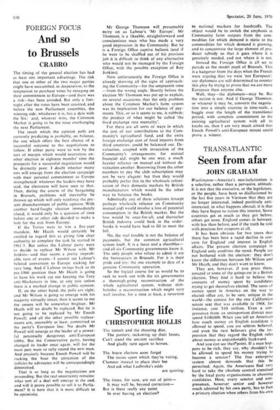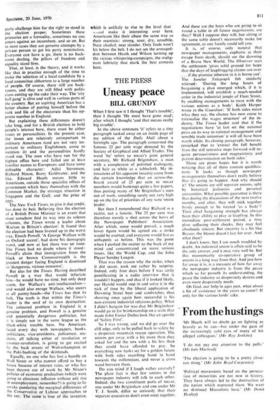TRANSATLANTIC
Seen from afar
JOHN GRAHAM
Washington—America's neo-isolationism is a selective, rather than a pervasive, attitude. It is not that the executive, or the legislature, or the people, have been so disillusioned by the last five years in Vietnam that they are no longer interested, indeed positively anti- interested, in what happens abroad; it is that they have begun to ration this interest. Some countries get as much as they got before, others get none. England comes in between, with less than before, and if the truth be told with precious few coupons at alL
It has been obvious for two years that there has been here a rapid decline in con- cern for England and interest in English affairs. The present election campaign in England only confirms the trend. People are not bothered with the election: they don't know the difference between Mr Wilson and Mr Heath, and they don't want to know.
They are, however, if you press them. amazed at some of the goings-on in a British election. They find it hard to believe the amounts of money spent by candidates trying to get themselves elected. The sums of money spent in America on the way to elected office are, to be sure, unique in the world—the contest for the one Californian senate seat that was available in 1968, for instance, cost $10 million. Even a con- gressman from an unimportant district may spend $100,000. When you tell an American how much money an English candidate is allowed to spend, you are seldom believed, and even the rare believers give the im- pression that they regard the English rules about money as unpardonably backward.
And you can see theirpoint. If a man hap- pens to be rich, they say, why shouldn't he be allowed to spend his money trying to become a senator? The free enterprise system almost demands that this be permitted. Again, the Americans find very hard to take the absolute control exercised by the local party organisations in choosing candidates. Here, every senator and con- gressman, however senior and however much admired by his own party, has to face a primary election when others from his own
party challenge him for the right to stand in the election proper. Sometimes these primaries are a formality, sometimes no one enters against an incumbent, and so on. But in most cases they are genuine attempts by a private person to get his party nomination. Everyone can have a go, there is no back- room dealing, the pillars of freedom and equality stand firm.
That, at least, is the theory, and it works like that in practice enough of the time to make the selection of a local candidate by a local committee abhorrent to a large number of people. Of course, there still are back- rooms, and they are still filled with politi- cians cutting up the cake their way. The 'city hall gang' is alive and well in various parts of the country. but an aspiring American has a better chance of putting himself before the rank and file of the electorate than his op- posite number in England.
But explaining these differences doesn't take long, and for a British election to hold people's interest here, there must be either issues or personalities. In the present case, the issues are relatively unimportant to ordinary Americans (and are not very im- portant to ordinary Englishmen, come to mention it) and the personalities hardly stand out. The men who have run for the highest office here and failed are at least familiar names to Europeans and have some definable character: Adlai Stevenson, Richard Nixon, Barry Goldwater, and the like. Edward Heath means little to Americans, outside those specialist offices of government which busy themselves with the Common Market, the strategic situation in Singapore and the Gulf, and the price of eggs.
The New York Times, to give it due credit, has done its beit. Believing that the election
of a British Prime Minister is an event that
must somehow find its way into its solemn columns, the Times wrote a leader about
'Racism in Britain's election'. It found that the election had been livened up in the worst way. Enoch Powell, 'A George Wallace with
an Oxford accent', had done his demagogic worst, and now at last there was an issue. The Times had no doubt where it stood: Powell's claim that immigration from the black or brown Commonwealth is the greatest danger facing England is dismissed as 'dangerous, vicious nonsense'. But alas for the Times. Having described Powell in a way that would infuriate
him—he would have no time, but only deep scorn, for Wallace's anti-intellectualism— and would also enrage Wallace, who sneers
at all pointy-heads—the Times has shot its bolt. The truth is that within the Times's leader is the seed of its own destruction. The coloured problem in England is a genuine problem, and Powell is a genuine -
and potentially dangerous politician, but it is simply not in the same league as the black-white trouble here. No American, faced every day with newspapers, books, politicians, vice-presidents, policemen, stu-
dents, all talking either of revolution or counter-revolution, is going to get excited by the back streets of Wolverhampton or the Paki-bashing of the skinheads.
Equally, no one who has lost a bundle on Wall Street or who cannot afford to buy a house because of interest rates, or who has been thrown out of work by Mr Nixon's policies of economic gradualism (which were going to eliminate inflation without atii rise in unemployment, remember?) is going to lie awake pondering the marginal differences of
the Conservative or Labour approaches to the EEC. The same is true of the invective,
which is unlikely to rise to the level that make it interesting over here. Americans like their abuse the same way as their martinis: strong, sour, dry, unsubtle. Neat alcohol, neat slander. Only fools won't hit below the belt. I do not see the armaged- don between Heath and Wilson turning up the vicious whispering-campaigns, the malig- nant lubricity that mark the best contests here.



































 Previous page
Previous page